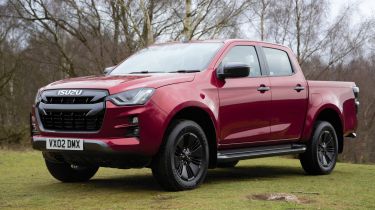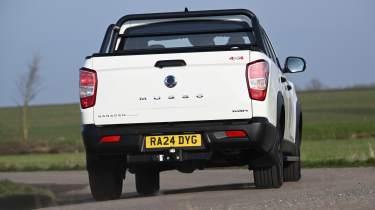Double-cab pick-up truck tax explained: company car tax and VAT in 2025
The inside line on HMRC’s VAT and Benefit-in-Kind tax rules for those using double-cab pick-ups as company vehicles

For years, the popularity of the double-cab pick-up truck has been fuelled by favourable tax legislation, possibly more so than for any other type of vehicle on the UK car market.
As of April 2025, however, the rules changed to make running a pick-up no longer quite as cost-effective as it used to be. If you’re now thinking “but surely the government said it wouldn’t be making any changes to pick-up truck tax?”, then welcome to the random, flip-flopping machinations of UK governance.
So how did we get here? In February 2024, HMRC announced that the tax rules on pick-up trucks were set to change and that double cab pick-up trucks with payloads of over 1,000kg would no longer be classified as commercial vehicles for Benefit-in-Kind (BIK) company car tax purposes. They would instead be classified and taxed as cars. Outcry from pick-up users ensued and within days HMRC had back-tracked, announcing that the commercial vehicle tax classification would remain after all.
Since then, the government has clarified that while single-cab and extended cab pick-up tax will be unchanged, double-cabs ( models with four doors and a row of seats behind the driver and front passenger) would, from April 6th 2025, be treated as personal vehicles rather than commercial vehicles in the eyes of the taxman. Thankfully, VAT regulations remain unchanged, so business owners can still claim back VAT on the truck they buy.
Why are double-cab trucks popular?
The appeal of the double cab pick-up truck has long been that these five-seat vehicles, often with very well-appointed and car-like interiors, have been classified as commercial vehicles and those using them as company cars have paid the flat ‘commercial vehicle’ rate of BiK company car tax. This is in contrast to the company car tax system, which is calculated using the vehicle’s CO2 emissions. Now, because the government deems double-cabs usable as private vehicles, they’ll be taxed as such, if you’re running one as a company car.
The current rules state that any double-cab pick-up with a 1,000kg minimum payload will only incur the flat commercial vehicle rate of company car tax. If the truck has a load bay cover installed, the minimum payload to qualify increases to 1,045kg.
The 2024 double-cab pick-up BiK tax changes that weren't
HMRC almost immediately U-turned on new guidance issued in February 2024 that said double-cab pick-ups would be classified as cars for company car tax purposes. A statement on February 19 2024 said that: "The government has listened carefully to views from farmers and the motoring industry on the potential impacts of the change in tax-treatment. The government has acknowledged that the 2020 court decision and resultant guidance update could have an impact on businesses and individuals in a way that is not consistent with the government’s wider aims to support businesses, including vital motoring and farming industries."

The reference to the '2020 court decision' in the statement pertains to HMRC winning an appeal against Coca-Cola in 2020 over the tax classification of five-seat vans. Two Volkswagen Transporter Kombis and a Vauxhall Vivaro crew van run by the company and classed as vans for tax were judged to be being used as cars.
Since then there had been a long-running debate around the tax treatment of vehicles that walk the fine line between van and car. Doubts have circled the tax classification of vans and pick-up trucks with two rows of seating and, following the pandemic, HMRC stepped up its investigations into the issue. The writing was apparently on the wall for double-cabs and in recent years we’ve seen a significant reduction in the number of these models being offered on the UK market. That’s unlikely to improve now the desirable models have lost their company car tax advantages.
How much will you pay in double-cab company car tax from 2025?
Double-cab pick-up trucks with payloads of over 1,000kg were previously taxed as commercial vehicles. That means company car users in the 20 per cent income tax band would pay a flat annual rate of £792 per year in BIK tax and 40 per cent tax payers would pay £1,584.
That changes from April 6th, 2025. As a company vehicle, a double-cab pick-up is now taxed just the same as a private vehicle. Since these trucks aren’t the most fuel-efficient of things, pretty much the entire market will fall into the maximum 37% BIK band for company users.
Company car tax example
How does that affect your tax burden? Take the Ford Ranger: most models in the range have a P11D value upwards of £40,000, you’re now looking at Benefit-in-Kind figures of £15,000 or more, which means a bill for a 20% taxpayer of at least £3,000, or £6,000 for a higher-rate taxpayer. And those numbers only go up from there – £50k’s worth of Ranger would be taxed at around £3,700 or £7,400 respectively.
Double-cab pick-up tax benefits for employees and employers
Driving or supplying a pick-up truck classified as an LCV used to have significant tax implications for both employees and employers. With the BIK employee benefits now negated, the main benefit remains the fact that VAT-registered purchasers of pick-ups can reclaim substantial amounts of VAT and companies can often write-off the full purchase cost against tax.
VAT and Capital Allowance benefits on double-cab pick-ups
Pick-up trucks remain classified as commercial vehicles for VAT purposes. All light commercial vehicles (LCVs) – including double-cab pick-ups with payloads over 1,000kg – qualify for VAT reclaims, as long as the business that purchases the vehicles is VAT registered, of course. The amount of VAT that’s reclaimable depends on how much of the vehicle’s mileage is driven for business. If it’s 80 per cent business mileage, then 80 per cent of the VAT can be reclaimed from the taxman.
This is very different to the position with company cars, as they are only eligible for VAT reclaims if they’re used 100 per cent for business. (Unless they’re bought for use as a taxi, driving school, private hire, or other limited exceptions.) Driving to work from home is not considered as business use by HMRC – a driver who commutes would lose a business all the VAT on a company car, but would lose only a percentage of the VAT on a pick-up.
Pick-ups that are purchased by a business are also eligible for writing-off against Capital Allowances much sooner than company cars. LCVs qualify as ‘plant and machinery’, so the purchase cost can usually be written off in the first year, whereas the write-off rate for company cars could be as low as 8 per cent per year.
Check the details with your accountant
As with all aspects of taxation, it is the responsibility of individuals and businesses to understand the rules and regulations and act accordingly. As personal and business circumstances can vary so widely, it’s vital that anyone considering swapping their company car for a pick-up should take professional accounting advice. The overview we’ve provided is for general guidance only.
The story of the UK pick-up truck market
The latest batch of double-cab pick-ups are larger and tougher than they have ever been before, making them ideal workhorses for tradesmen and those professionals who genuinely need off-road capability. Double-cabs aren’t simply more capable and practical than their predecessors, but manufacturers have increasingly loaded high-spec versions of their commercial pick-up trucks with glamorous styling accessories and the type of luxury options you’d expect to find in an executive car.
Not helped by the looming change to the commercial vehicle company car tax classification, the UK pick-up sector has shrunk markedly in recent years. Popular names like the Mitsubishi L200 and Nissan Navara have departed along with newcomers like the Mercedes X-Class and Fiat Fullback. We still have the likes of the Ford Ranger, Isuzu D-Max, Toyota Hilux and VW Amarok, plus the KGM Musso and the electric Maxus T90 EV - which could be a good option for those who need a double cab as a company car but want to reduce their tax liability.
With the tax advantages of running a cool-looking double-cab pick-up instead of a traditional family car or SUV now a lot less, the future of the UK market looks uncertain. Even the best driving 4x4 pick-up will feel unwieldy and unrefined to many drivers thinking of switching from a regular road car, so the appeal of the double-cab pick-up now resides very much in its toughness and off-road ability.
Our Car Tax Checker tool lets you check your tax status and renewal date in seconds. Check your VED car tax now...
Find a car with the experts





